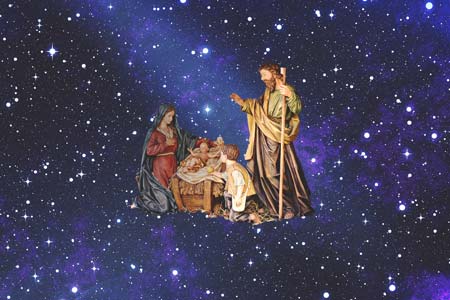 Isaiah 52:7-10
Isaiah 52:7-10
 Hebrews 1:1-6
Hebrews 1:1-6
 John 1:1-18
John 1:1-18
"In the beginning was the Word, and the Word was with God, and the Word was God" (John 1:1). The prologue of the gospel of John, which we hear in this Sunday's gospel reading, sets itself apart from the other three gospels by adopting the opening expression of the first book of the Old Testament, "In the beginning," or "be-resheeth" in Hebrew, from which the name of the book, "Genesis" which means "origin" in Latin, was derived.
By adopting the opening expression of Genesis, John wishes to communicate to us two "beginnings". First, the beginning of Jesus in terms of his genealogy. Unlike the Matthean genealogy which goes forward in time from Abraham to Jesus, and the Lucan genealogy which goes backward in time from Jesus to Adam, the Johannine genealogy transcends time and goes "upward". In fact, it is out of this world in that it traces Jesus' origin directly to God: "In the beginning was the Word, and the Word was with God, and the Word was God" (John 1:1). Whereas Matthew's and Luke's genealogies are historical and human, John's is transcendent and divine. For what is God's origin but God Himself?
Second, in repeating Genesis' well-known opening statement, John is harkening back to God's be-all-and-end-all act of creation in Genesis. In so doing, John wishes to draw our attention to a very different kind of creation account that his gospel endeavors to offer: one whose primary concern is the New Creation that Christ ushered in through redemption, one in which darkness is no more and true life is what the human race will enjoy (cf. John 1:4-5, 10:10).
What causes the theologians to believe creation is the common thread connecting the opening chapters of Genesis and John is more than "imaginative theology". The scriptural evidences that they came up with to support this position are eye-opening to say the least. Worth mentioning among others are:
- Since everything is created through the Word (John 1:3, Col 1:16, Eph 2:10, Prov 8:22-30), His presence was prominent and indispensable in both creation accounts (in Genesis, God created by what He "said", i.e. by His word; in John, all things came to be through the Word (John 1:3)).
- Like Genesis, John’s creation account contains a day-by-day narration of events and activities, totaling 7 days (John 1:1, 29, 35, 43 being the first 4 days plus 3 days – “On the third days” - in 2:1).
- Like Genesis whose creation culminates in the Sabbath on the 7th day, the day of holiness of which man must partake, John's creation account also culminates on the 7th day in the wedding in Cana, a mirror image of the heavenly wedding of the Lamb (Rev 19:9), i.e. the eschatological union of God and man in the New Creation that Sabbath points us to.
Beautiful indeed "are the feet of him who brings glad tidings" (Is 52:7, the first reading), first the Lord Himself personally (Heb 1:2, 2nd reading), then the apostles, and now the Church which includes you and me. This Christmas let's go caroling. Let's get on top of the mountain and shout at the top of our lungs. Let's do whatever it takes to bring glad tidings to the world. For Christ our Lord - the Messiah, the Holy Infant who was born through the Virgin Mary in the fullest of time (Gal 4:4) – is come! For us men and for our salvation He comes. To become a man He comes. For the Son of God must come down from heaven to become the Son of Man so that the sons of men could be transformed to become the sons of God - the New Creation! That is why John wrote his gospel. That in a nutshell is the real Christmas message that must be proclaimed!
